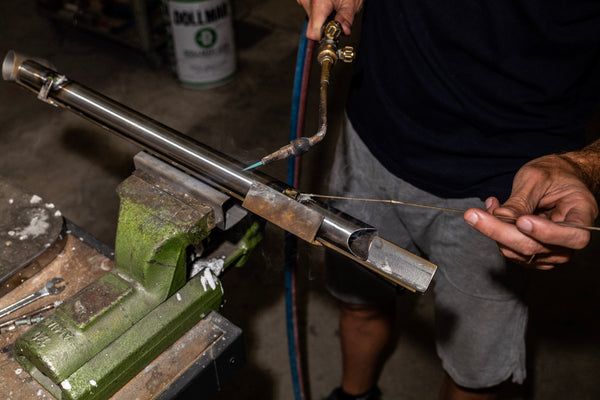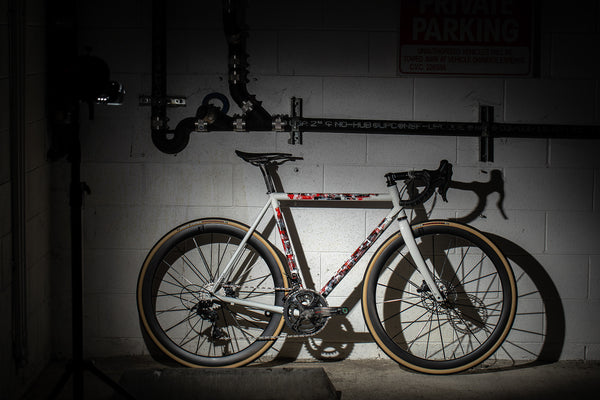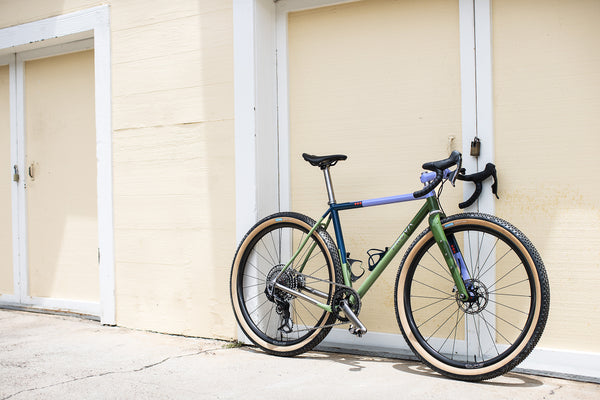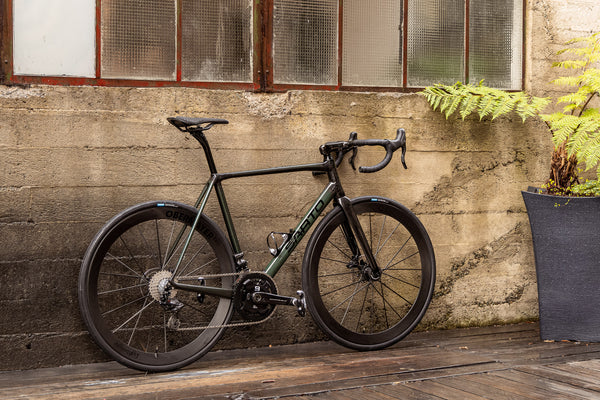THE CIRCUS
Le Tour. Cycling's own Greatest Show on Earth. I've been to my fair share of bike races, and this one easily - by a significant margin - takes the cake when it comes to sheer size, spectacle, and volume, something that's difficult to comprehend without actually being there. This year, by a stroke of chance, I've found myself in the thick of it, milling around with the commentariat of Le Tour, its beloved TV personalities that narrate the Grand Boucle to all corners of the Earth (provided the VPN tunnel has enough bandwidth). It seemed logical, then, to chat with a few of its members about the storied race during Stage 18's clamber up the legendary Col d'Izoard: UK-based ITV's David Millar, NBC's Bob Roll with help from Christian Vande Velde, and Danish TV2's Brian Nygaard.



THE BRITON
David Millar and has been around the block. Most of us know David's story, the Scot phenom who took cycling by storm in the mid-90s as he rose to prominence on the once-upon-a-powerhouse French squad Cofidis. Many said he'd be Britain's first Tour winner, but in the darker days of cycling, it wasn't to be, instead, he was arrested for doping, suspended, and returned for redemption by helping found "clean-team" Garmin-Slipstream. Now, after winning stages in every Grand Tour, he's retired, living in Girona, Spain, running a clothing brand (CHPT3), and commentating on racing for ITV. And driving a Maserati around France.
AC: How exhausting is three weeks of commentary compared to racing?
DM: It’s different. It’s more monotonous. At least with the racing, you’re in it. Commentary is hard because you’re simply talking all the time, especially with the new format with a live feed all day from roll-out to the end. It’s a bit too much, in my opinion, it becomes quite repetitive.
AC: How do you keep from repeating yourself?
DM: You have to find cycles in the race – it has to become more of a chat when it’s quiet. We need to bring guests in, and turn it into something like a podcast. When the race is good, it’s pretty easy, there’s loads to talk about, especially during the Tour de France. There are so many different stories going on and so many big names, but it is very hard to stop yourself from repeating, you have to be very careful.
AC: Do you think the start-to-finish format is going to change?
DM: At the moment, no, I think it’s been a success. Everything is on site anyway, so it doesn’t cost that much more to do the feed live all day. And the way that the world is going with the internet and so much going on, there are other [content] channels to support.
AC: Changing gears on something I’ve been pondering here, why is the Tour so much bigger than everything else?
DM: I don’t really know. It’s definitely the best produced, ASO does the best job. The Tour was the first, and it’s the most prestigious, but I don’t really know why. I mean, the Giro should be pretty similar, but it’s just not.
AC: Completely – coming at it from a pure marketing standpoint, the Giro has – and the Vuelta, even, arguably have better marketability.
DM: Yeah, better races, often. At this race, the level is so high [amongst the riders], everyone is at the same level. The Giro and the Vuelta produce great racing, whereas the Tour often doesn’t.


THE AMERICANS
Bob Roll, more commonly known as "Bobke", needs no introduction. The former Motorola, 7-Eleven, and Team Z legend is now a larger-than-life American TV personality with a devoted US fanbase, and his affable, outgoing demeanor is hard to miss. As I crunched a meringue, I tracked him down the morning before Stage 19, along with former American professional and fellow NBC commentator Christian Vande Velde offering color commentary.
AC: Why is the Tour so big compared to any other bike race?
BR: I think it’s the shape of the country.
AC: Kind of lumpy?
BR: No, it’s a perfect circle. Honestly, I’ve thought about it a lot. The Italian peninsula is too narrow...
VDV: So why the fuck are we doing a figure-eight this year?
BR: Well, you’re talking 120 years [of going around in circles]. Italy is too narrow, and Spain is too…too spread out.
AC: How do you keep from repeating yourself when commentating?
BR: I hate the sound of my own voice. I hate the sound of my voice twice as much as the I hate the original sound of my voice, so I try to avoid it.
VDV: It’s a sin to plagiarize yourself.
AC: One more – how exhausting is commentating on the Tour compared to racing it?
BR: It’s a piece of cake. It’s like a non-stop party. It’s Club Med. Honestly, there’s nothing like racing the Tour.
VDV: It’s true. It’s still tiring. You’re still away from home. But if you start crying for one second, you’d better shut the fuck up and look out the door.


THE DANE
Brian Nygaard is one of those personalities involved in cycling that no ground-level fan knows, but has had his hands in the careers of hundreds of professional cyclists, with his marks across the results of plenty of bike races. Brian never raced before working in racing itself, and this is his 17th Tour de France. He did 16 with ProTour teams as a communications director (including CSC, Leopard-Trek, and most recently, Orica), and this is his first without any squad allegiance. Adding it all up, he’s spent a year-plus of his life at the Grand Boucle. “It’s not a destination for me for anything but work,” he said. He hates France. “It's very self-sufficient…in a negative way.” He has no heartfelt connection to the place. At all. And he, like most people here, wants Rigoberto to win.
AC: What’s really struck me is how big the Tour is.
BN: It’s the biggest sporting event in the world. Even for those of us who love cycling, we put the Giro almost up there with the Tour, which is totally in its place, but in terms of the people, the media, the attention, how much it’s worth performing well here for a bike rider, you can’t compare it. I remember once at Orica, we did an evaluation of ROI on our investments. We saw that almost 90% of our return was from being visible at the Tour. We had more ROI from a guy 20 minutes in the break [at the Tour] than winning Liege, which is absurd. It’s because of the eyeballs. There’s people in Taiwan watching the Tour, they’re not watching LBL. People who don’t watch cycling at any other time during the year, they watch the Tour.
AC: To come here and actually see that a bike race is an event – a real, live, big deal event, where regular people who don’t ride are paying attention…it’s kind of weird for an American like me.
BN: It’s 21 days of the Superbowl. People who don’t follow football, they watch the Superbowl
AC: But why is it so big?
BN: It’s an historical fact that it’s grown into this monster of cycling. There are definitely bike races that are more interesting and more beautiful, though this year has been an exception. It’s the history and the prestige that comes along with history. It’s such a fixture, and everyone who doesn’t know cycling – they know the Tour. That also means that the exposure and sponsors that are attracted based on that is one of the reasons. From a pure bike race perspective, there’s nothing here that you don’t see elsewhere – on the contrary sometimes.
AC: It tends to get fairly formulaic.
BN: This year has been a nice exception to that rule.
AC: Why? Crashes?
BN: It’s a bitch, right, you can’t really avoid that. It’s too bad when someone like Richie Porte crashes out, and I’ve seen some very tragic crashes in the Tour, I’m always happy to see people getting up afterwards. But it’s also being able to maneuver in any kind of terrain, it’s part of being a Tour winner. You have to be good at descending. You have to be good at avoiding bad luck. It’s such a weird thing to say, but I think a lot of the way a pro team approaches racing is minimizing how “unluck” can be part of what you do. You saw a guy like Lance, he minimized everything, he could walk on water.
AC: All the risk was gone, and all he had to do was show up. What’s your take on him suddenly showing up in cycling again?
BN: I’m glad that he – you can’t rewrite history. I think it’s pathetic when you look at the result list and his name is crossed out. It doesn’t work. I think it’s different now that I don’t work for a pro team anymore, but the guys coming in now are so young that they were finishing kindergarten when he was winning. It’s very far from their horizons, and I think that’s a good thing. But, someone like him who has strong opinions about things, and who knows a lot of interesting people, it’s why I’m curious to hear his podcast.
AC: Part of me is happy for that – he brings in a lot of esoteric and non-endemic perspectives and introduces them to cycling. He’s achieved real celebrity beyond just bike celebrity. But another part of me asks, “Can’t you just leave cycling alone?”
BN: He clearly can’t. One thing that I think is his Achilles heel is that he’s…if you’re facing a $100 million court case, bitterness prevails. But I think that bitterness sometimes gets the better of him. From a human respect, that’s totally understandable, but it’s not a particularly charming part of his behavior.
AC: Do you think the format of the Tour is ever going to change?
BN: It definitely already has. When you see that they’ve introduced shorter time trials, shorter mountain stages. They didn’t really do us a favor in my first year as a commentator, and they’re showing the whole broadcast live. We were sitting there just paddling on the first 200k stage with absolutely nothing to talk about.
AC: How hard is it not to repeat yourself?
BN: We completely emptied our repertoire of dirty jokes. We were basically doing a podcast at that point with a bike race in the background, and that’s fine. It’s good line training. One day, maybe I’ll be on the A team and talking about the real pointy end of the bike race.
AC: The race is even boring for the first 100k when you’re IN the bunch.
BN: Exactly. But, it’s a beautiful place. We’ve been through all five mountain ranges, there’s plenty to talk about. By default, we just make shit up.
AC: Like what?
BN: One of the first days we had a big discussion about the hermeneutics of peeing in the peloton. My co-commentator Chris Anker Sørensen, he’s a right-pee-er. Some guys pee on the left-hand side. And often, you’ll see guys pushing other guys [while they’re peeing] to stabilize them, but he couldn’t pee if someone was touching his butt. Nothing would start.
AC: I think peeing off the bike is one of the great underrated cycling skills. One no one practices.
BN: He’s turned it into perfection with practice, he would find a slightly downhill path so the bike maintained speed, and he’d figure out how to get that done.
AC: I’ve done it three times while racing, and it’s always horrible.
BN: I remember one year when Luke Durbridge won the Australian national title, he peed twice in his skinsuit on his way to victory. The first thing he said to me when he crossed the line was “Dude, you need to get me a new pair of bibshorts, this doesn’t look good.” There’s something about the introduction of skinsuits into road racing that has some downsides.










Back to Journal